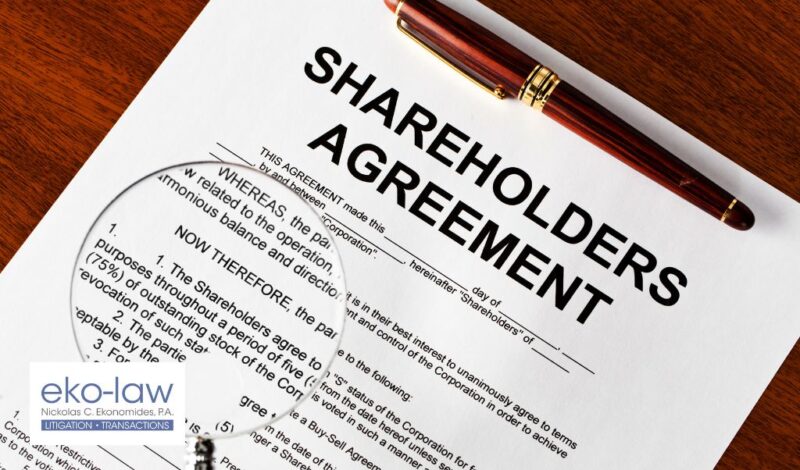Shareholder Agreements During a Business Sale or Merger
Shareholder agreements are one of the most foundational legal documents in any closely held corporation. Especially in the dynamic and competitive economic climate of Tampa Bay, Florida, such an agreement serves as the rulebook governing the corporation’s internal affairs, including shareholder rights, management structures, and dispute resolution procedures. But what happens to this vital document when the business undergoes a major transition like a sale or a merger?
For shareholders and business owners, understanding what becomes of the shareholder agreement during a sale or merger is essential. Without this knowledge, parties risk losing rights, protections, or value. This article will explore how these agreements function during transitions, what changes (or don’t), and what stakeholders should consider to protect their interests.
What Is a Shareholder Agreement?
A shareholder agreement (also known as a stockholders agreement) is a legally binding contract among a company’s shareholders that outlines rights, obligations, and protections. Unlike the articles of incorporation, which apply broadly under Florida corporate law and are filed with the state, a shareholder agreement is a private document tailored specifically to the needs of the business and its shareholders.
Typical elements a shareholder agreement includes:
- The number of shares each shareholder owns
- Rules for transferring shares
- Procedures for resolving internal disputes resolution
- Rights of minority and majority shareholders
- Voting provisions and board structure
- Confidentiality clauses safeguarding confidential information
- Restrictions or procedures for a selling shareholder to sell their shares
The agreement often supplements and overrides default rules under corporate statutes, offering a higher degree of control and predictability within closely held corporations.
The Impact of a Sale or Merger on a Shareholder Agreement
When a corporation in Florida undergoes a sale or merger, one of the first questions that arises is: What happens to the shareholder agreement? The answer depends on the structure of the transaction and the content of the agreement itself.
Asset Sales vs. Stock Sales vs. Mergers
The type of transaction substantially affects the continuing relevance of the shareholder agreement:
1. Asset Sale
In an asset sale, the buyer acquires the company’s tangible and intangible assets, and the selling corporation—along with its shareholder agreement—may remain intact for legal and tax purposes.
In this case, the shareholder agreement may remain binding among the existing shareholders, unless winding up or dissolution is triggered. However, if liquidation follows, the agreement typically becomes void after all responsibilities and obligations are terminated.
2. Stock Sale
A stock sale involves the selling shareholder(s) transferring their shares to a buyer. Here, the shareholder agreement is instrumental. If the agreement includes right-of-first-refusal clauses, drag-along/tag-along rights, or consent requirements, these provisions become actionable.
For example:
- Right of First Refusal (ROFR): Existing shareholders may have the option to purchase shares before they go to an outside party.
- Drag-Along Rights: A majority of shareholders can compel minority shareholders to sell.
- Tag-Along Rights: Minority shareholders can join in a sale. This ensures they are not left behind.
The buyer steps into the shoes of the selling shareholder and often becomes subject to the existing agreement, unless it is amended or replaced.
3. Merger
In a merger, two or more entities combine, which can result in either a continuation of the surviving entity or formation of an entirely new entity. The fate of the shareholder agreement in a merger depends on how the merger is structured and what the agreement stipulates.
If the original company survives, the agreement may remain effective subject to modifications by the new majority or under corporate law requirements. If a new entity is formed, however, the older agreement often terminates, and a new agreement may be required.
Key Provisions in Shareholder Agreements Affected by Mergers and Sales
When addressing a business sale or merger in Florida, the following shareholder agreement provisions are critical:
Transfer Restrictions
Most shareholder agreements impose restrictions on transferring shares. These can include obtaining board approval, notifying other shareholders, or honoring buy-sell provisions. These mechanisms are designed to preserve control and protect internal relationships within the company.
Sale Approval Rights
Agreements often require a supermajority or unanimous shareholder approval for the sale of the company. This ensures that no single shareholder or director can unilaterally approve a major transition.
Confidentiality and Non-Compete Clauses
Due diligence during business transitions involves sharing confidential information with potential buyers. Shareholder agreements may include clauses outlining how confidential information can be shared and require nondisclosure agreements from prospective buyers.
Additionally, non-compete or non-solicitation clauses help prevent existing shareholders from starting or joining a competing business after selling.
Exit Plans and Buyout Terms
Effective agreements often include pre-negotiated valuations, buyout formulas, or trigger events for forced or voluntary exits. These provisions help guide negotiations during high-stakes transactions and can reduce the risk of disputes.
Protecting Minority Shareholders During Business Sales
A critical mission of the shareholder agreement is to balance power among majority and minority shareholders. During a sale or merger, minority shareholders may feel vulnerable to unfair treatment.
Clear protections such as:
- Tag-Along Rights
- Guaranteed minimum buyout prices
- Equal treatment and informational rights
…can shield minority interests. These clauses are particularly important in Tampa Bay’s growing but competitive M&A landscape, where small business owners often find themselves in unequal bargaining positions.
Dispute Resolution: A Crucial Provision
Disagreements can emerge over sale price, transaction terms, or whether certain shareholders were adequately informed. This is where the dispute resolution clause of the shareholder agreement plays a vital role.
Most agreements contain one of the following:
- Arbitration Proceedings
- Mediation Requirements
- Exclusive Jurisdiction Clauses (often in Florida state courts)
These provisions aim to minimize lengthy and expensive business litigation. However, if a lawsuit becomes inevitable, working with a skilled commercial litigation attorney is paramount to preserving your rights—especially one familiar with business law in Tampa Bay.
The Role of a Commercial Litigation Attorney in Tampa Bay
A business sale or merger can become contentious if the shareholder agreement is unclear, outdated, or inconsistent with the parties’ goals. In these situations, working with a knowledgeable commercial litigation attorney in Tampa Bay like Nickolas Ekonomides is advisable.
Legal counsel assesses:
- The enforceability of the agreement
- Whether the agreement applies to the new entity after restructuring
- Options if one or more parties breach contractual obligations
- Whether shareholder approval was properly obtained
- Remedies for shareholders being treated unfairly
Pre-sale planning with legal counsel can reduce the chance of entering into commercial litigation later. Even when litigation becomes unavoidable, a clear strategy centered on the terms of the shareholder agreement often leads to better outcomes.
Tips for Reviewing Shareholder Agreements Before Sale or Merger
Before initiating a sale or entering merger talks, Florida business owners and shareholders should:
1. Review the Existing Agreement Thoroughly
Make sure you understand what the agreement includes about transfers, exit rights, and dispute mechanisms. Some provisions may be automatically triggered during discussions of a sale or merger.
2. Update the Agreement if Needed
If parts of the agreement seem outdated, consult a legal professional to amend them before beginning the transaction process. This can prevent costly misunderstandings later.
3. Identify Any Triggers
Clauses like “change of control” provisions may require certain actions or approvals. Identifying these in advance can streamline the transaction.
4. Ensure Alignment Between Shareholders
The agreement should reflect current ownership stakes, obligations, and governance expectations. Verifying that signatures and share amounts are correct minimizes possible commercial litigation.
5. Seek Legal Advice Early
Whether you are the selling shareholder, buying party, or a minority owner, a business attorney can help evaluate your rights under Florida law and safeguard your position before binding documents are signed.
Common Shareholder Disputes During Sales or Mergers
Disputes among shareholders are not uncommon during high-stakes transitions. Common issues include:
- One shareholder attempts to sell their shares without proper consent.
- Majority shareholders attempt to force a sale at an undervalued price.
- Failure to adequately notify existing shareholders of sale terms.
- Disagreements about whether a merger triggers dilution of ownership.
In these cases, litigation might arise unless the agreement’s dispute resolution provisions are followed. These disputes often center around how many shares issued are eligible for voting, whether procedural steps (such as notice requirements) were met, or whether the sale complies with both the shareholder agreement and the articles of incorporation.
FAQs About Shareholder Agreements in Business Sales
Can a New Buyer Be Forced to Comply With an Existing Shareholder Agreement?
Yes. In most stock sales, the buyer steps into the seller’s position and becomes a party to the existing agreement—unless otherwise modified.
What Happens If Shareholders Have No Agreement During a Sale?
The transaction defaults to Florida statutory corporate laws and the articles of incorporation. This often leads to ambiguities and increases the potential for disputes.
Are Tag-Along and Drag-Along Rights Enforceable in Florida?
Yes. If correctly drafted and included in the agreement, courts generally enforce these mechanisms during a sale.
Who Has to Approve a Sale Under a Shareholder Agreement?
Typically, the agreement outlines if supermajority or unanimous approval is needed. The threshold depends on what the agreement specifies.
Contact Eko Law Today for Commercial Litigation Assistance in Tampa Bay
A Florida business sale or merger is a complex process, especially when multiple shareholders are involved. The shareholder agreement is your first line of defense against unintended consequences or unfair treatment. Whether you’re a majority or minority shareholder, planning to sell your shares, or just trying to ensure your interests are respected, understanding the agreement’s role is crucial.
To protect your business, minimize risk, and avoid pitfalls, proactive review and legal counsel are essential steps. A poorly managed transition can unravel even the most successful enterprise.
If you are facing a potential business sale, merger, or shareholder dispute, reach out to Nickolas Ekonomides, a trusted commercial litigation attorney in Tampa Bay.
Contact Nickolas to schedule a legal consultation.







